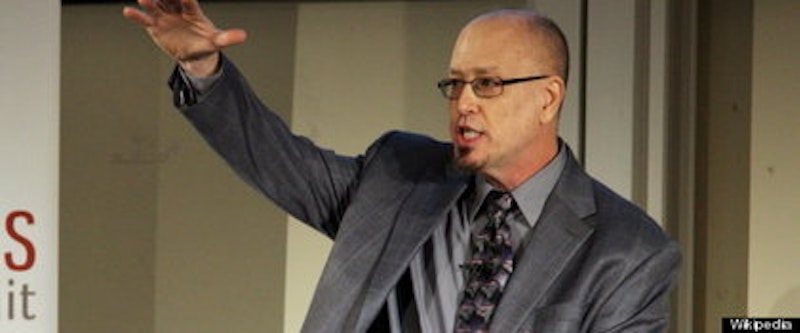Americans love liberty, but it's often unclear whether that’s really a love of freedom or its opposite. Defenders of the Second Amendment talk about liberty, for example, but the discussion often seems like an excuse to revel in paranoid fantasies about black helicopters and UN oppression. Similarly, excoriation of the welfare state can appear less concerned with the supposed bonds of entitlement than with the vindictive pleasures of power—the glee in making sure that nobody else gets something for free.
Steven Landsburg's recent already-notorious post about the Steubenville rape shows the fissures in our concept of liberty perhaps even more clearly. Landsburg attempts to determine what things should be illegal by doing a thought experiment. Just because "Bob McCrankypants" is caused psychic distress at the thought that somewhere someone is watching porn, Landsburg argues, that's no reason to ban porn. Just because "Granola McMustardseed" is upset that someone is cutting down trees or altering the natural environment, that is no reason to infringe someone else's private property rights. Landsburg goes on to conclude that, logically, if I am unconscious and someone rapes me, the fact that other people find this horrifying shouldn't make it illegal. Or as he says:
As long as I’m safely unconscious and therefore shielded from the costs of an assault, why shouldn’t the rest of the world (or more specifically my attackers) be allowed to reap the benefits? And if the thought of those benefits makes me shudder, why should my shuddering be accorded any more public policy weight than Bob’s or Granola’s? We’re still talking about strictly psychic harm, right?
Landsburg doesn't use the word "liberty" in his post, but in comments he notes that the issue here is essentially property rights, and the ability to exercise those rights without interference. You have a right to watch your own porn movies in your own home, without regard to the feelings of others. You have a right to drill for oil on your own property, without regard to the feelings of others. And… you have a right to rape other unconscious bodies that happen to show up in your dorm room, without regard to the feelings of others? Where exactly did that come from?
Landsburg in a follow up post argues that he picked rape as an example because "rape is particularly bad, so we can be quite sure we don't want to adopt a rule that might allow it, even in the extreme hypothetical case with no physical damage." In other words, rape is a limit case which seems to call into question the assumptions about property rights. Landsburg concludes that he isn't sure how to create a general rule about how to outlaw harmful actions without infringing on other people's liberty.
Again, I think what Landsburg is running up against here is the quandary of liberty itself. In his book Debt, David Graeber argues that our conception of property rights derived from the Romans. The Roman conception of property rights, in turn, was derived in large part from their experience with the institution of slavery. Liberty for them was the property right of absolute control over what was yours, and that absolute control occurred in the context of control over slaves. The idea that you can own your body, that you can be absolutely free, is in fact intended as a way to make it possible for you to transfer that ownership—either legally or, in Landsburg's extreme example, simply by being unconscious.
Landsburg's decision to use rape as an example, then, is not quite as arbitrary as he seems to think. On the contrary, our language of liberty and rights is intrinsically tied to notions of slavery, and asserting power over others. Liberty means that you are not bound to others. You can use your property as you wish, and if it upsets other people, or even if it destroys the common air and soil that other people need to live, that is tough shit. Rights are absolute, they do not need to be negotiated within a social context, nor do they need to be measured by human dignity. Thus, the world of absolute liberty is, inevitably, a world in which everybody is a potential slave, each body absolutely subject to everyone else's absolute right to the pleasures of violation and dominance.
Landsburg seems somewhat befuddled at where his logic has taken him. How could an argument from the absolute assertion of liberty and property rights lead to the advocacy of tyrannical abuse? The answer is that absolute right is absolute power, and that liberty conceived as untrammeled freedom will always be tyrannical. Freedom from caring about our fellow human beings is, as someone said, just another word for nothing left to lose.
Noah Berlatsky (@hoodedu) blogs at Hooded Utilitarian.

